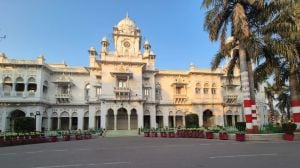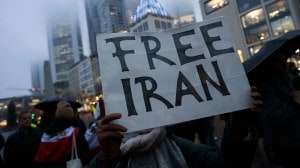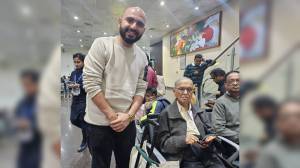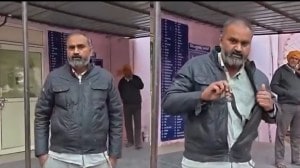Clutching at CVs
What if, after they had completed their education, somebody in Great Britainhad offered employment to Gandhi, Nehru, Jinnah and Subhash Ch...

What if, after they had completed their education, somebody in Great Britainhad offered employment to Gandhi, Nehru, Jinnah and Subhash Chandra Bose?Would they have stayed or returned home, as they eventually did, forpersonal, professional or ideological reasons? You may insist that servingthe British Empire was an anathema to some of them. On the other hand,somebody else may argue that so many Indians did, after all, journey toLondon to qualify for the civil service in order to join the quot;heaven-born.quot;
Long ago the quot;steel framequot; of the Empire disappeared but other openings forthe young and enterprising graduates grew as Western economy recovered fromthe effects of World War II. From the early 1970s, scores of students,trained and tutored in our highly subsidised educational system, set theireyes on a career in the West and, more particularly, the United States.Thus, the exodus 8212; call it brain drain, if you like 8212; of doctors,engineers and computer scientists gathered momentum. Believe it or not, somejobs are up for grabs even in social sciences.
So book your passage for Chicago, the venue of the Association of AsianStudies AAS meeting next year. Just turn up at this grand annual tamasha8217;with your curriculum vitae and get yourself interviewed by a selectioncommittee. I did not carry mine to San Diego this year and, therefore,missed the golden opportunity. But I did see young historians and politicalscientists flocking to the Convention Centre. Basking in the gloriousCalifornia sunshine, they were trying their luck in this land of milk andhoney. In the list of AAS members, I also noticed the significant presenceof Indian social scientists occupying professorial positions in prestigiousAmerican universities. This did something to soothe my national pride. Ibelieve several others from the academia, including a couple offellow-historians, are waiting for the bell to ring from Chicago, Berkeleyand Minnesota.
From this distance I can only say bon voyage8217; to them. I have no problem atall with those in search of greener pastures. Nor do I support the move,being contemplated in some quarters, to impose curbs on their settling inthe West. In this age, we can surely share the wisdom of Amartya Sen,Ranajit Guha and Gyatri Spivak sitting in Ballia or Basti. There are noconsolation prizes or bonus points for those travelling by our city buses toaccess research libraries, drinking Kutti8217;s tea at the Nehru Memorial Museumand Library or eating greasy omelettes and samosas at Delhi8217;s NationalArchives en route to the unlikely prospect of achieving academic stardom.But, one is still curious to learn why our young and senior scholars leftand, more importantly, why others are still going. Why should a professor inJawaharlal Nehru University or the Delhi School of Economics settle for asimilar position in the US? Is it the lure of the crisp American dollars, orthe search for a secure and vibrant academic enclave? Is it for children8217;seducation or pure and simple personal career advancement? Perhaps, the HRDMinistry will take time off its mindless ideological crusade and considerthe long-term implications of brain drain.
Whatever the reasons, America8217;s gain is India8217;s loss. Nehru8217;s temples oflearning are located outside and not within India. The net result is thatour educational centres are gradually losing some of our best socialscientists and, in the process, weakening the intellectual edifice soassiduously built in the 1950s and 1960s. In my own discipline, a number ofeminent historians have either emigrated or declared their intention to doso in the near future. I miss them and bemoan their absence. How does oneaccount for the loss of academic talent? I do not claim to know the answers,but I do believe that some of our outstanding men and women are simplydriven out by the inertia of the system and its inept administrators.
The long-awaited restructuring in our university system, which would haveimproved the functioning of our universities, has not taken place. Instead,we have diverted the already scarce resources from the universities toresearch centres. In our universities themselves, we have legitimised,thanks to the ill-advised quot;merit promotionquot; scheme, mediocrity in thecorridors of knowledge. We recognize differentiation in other areas, but wetreat, in a spirit of equanimity, good and bad teachers/researchers alike.Such is our benevolence that we promote teachers regardless of merit andallow them a voice in the decision-making bodies. Such is our commitment tothe oral tradition that we appoint professors without expecting them towrite a book. It is infuriating when such persons quote French/Germanscholars, many of whom are not read in their own countries, and begin topontificate on how history should or should not be written.
All said and done, our system accords no recognition to merit; consequently,delinquents get suitably rewarded with academic promotions and the riches ofadministrative office. Diligent scholars, on the other hand, find themselvesat the receiving end. What this does to the enthusiasm of younger scholarsis anybody8217;s guess. A case in point was the relentless persecution of ImtiazAhmad, a sociologist at the JNU. He would have contributed so much more hadhis colleagues rallied around him to isolate his detractors. By the timethey did, he had lost years of his creative life.
For those accustomed to intellectual freedom during the past five decades,barring the Emergency, the disconcerting element is the rise of intolerance,as illustrated by the despicable attack on Asghar Ali Engineer, resurgenceof religious bigotry, and attempts to stifle dissent in civil society.Attacks on the minorities, notably the Christians, the bizarre ICHR episodeand vandalism in places like Kanpur and Varanasi are symptomatic of a deepermalady in our state and society.
Enough is enough. Somebody must draw the Lakshmanrekha and make sure that asmall group of hoodlums do not destroy freedom and democracy. Somebody hasto tell them that quot;the upsurge of ugly Hindutvaquot; Tavleen Singh willeventually destroy our rich heritage and the creative energies of ourpeople. Somebody has to remind them of the damage they do to themselves bytargeting the likes of M.F. Husain, Dilip Kumar, Deepa Mehta, Shabana Azmi,and eminent social scientists. We must, instead, value such persons andtheir contributions to our society.
If, on the other hand, the self-styled custodians of knowledge, art andculture do not pay heed to the voice of reason and moderation, many morescholars, aware of what happened in Nazi Germany, would seek refuge in thesalubrious climes of the West.
- 01
- 02
- 03
- 04
- 05































